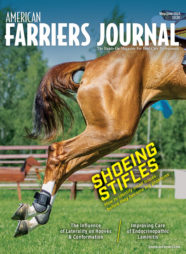In January 2018, the American Veterinary Medical Association (AVMA) published proposed changes to the Model Veterinary Practice Act (MVPA). As its name would suggest, this serves as a guideline for each state to base their individual rules from the practice of veterinary medicine. Among the changes was the removal of the farrier exemption from the MVPA. You should read this as background information to formulate your own opinion.
The AVMA is asking for feedback on this and other MVPA changes, due by March 25, 2018.
Opinions on this range from, “farriers who stay within the confines of farriery have nothing to be worried about here” to “farriers will fall under the direction of veterinarians,” and everything in between. Many in the farrier industry are furious, believing this change signals a bureaucratic attempt to gain oversight of their trade. We’ve received phone calls and emails on this subject from many of those with this mindset.
Any opinion is based either on trust of the AVMA, history or speculation. Speculation runs wild because the AVMA has issued variations of a standard public relations message combined with the advice of “wait and see after we get the feedback” and reminding that adaption is up to each individual state. The AVMA also points out that only 15 states exempt horseshoeing and 26 lack any mention of farriers.
These answers won’t satisfy farriers who are concerned about the implications. So we seem to be in a holding pattern on information until the AVMA provides further comment. I’m not sure what would satisfy those who question intention. So with only speculation for the future, some have been looking back regarding this issue. Being a student of history, AFJ founder Henry Heymering reminded me of an 2004 editorial by Editor Frank Lessiter on how one state board defined some areas of veterinary medicine:
“When Florida massage therapists, light therapists and animal communicators started receiving cease and desist orders, the Florida Board of Veterinary Medicine was asked for an interpretation of the state’s veterinary practices law. [the way the VPA of FL was written, the Board’s written interpretation becomes law].
"After the board failed to respond, the Florida Alliance For Animal Owners Rights submitted this list of practices the they felt would never be considered to be practicing veterinary medicine:
1. Acupressure
2. Aromatherapy
3. Animal communication
4. Farriery
5. Flower-essence therapy
6. Hands-on healing
7. Homeopathy
8. Light therapy
9. Magnet therapy
10. Nutritional counseling
"So you can imagine alliance members’ shock when the state board on March 2 decided that all 10 qualified as the practice of veterinary medicine. …
“While it’s not likely that farriers will be told they can’t shoe horses without the approval of a vet, that’s unfortunately now the law in Florida. And the state has already tried to stop some folks from practicing their trades. …
“The important lesson from this controversy is that it’s time to defend the shoeing profession and make sure everyone in the equine business is fully informed on what’s happening. Other states have already faced similar problems and your state could be next…."
Maybe the AVMA wasn’t the cause for this concern 14 years ago, but for Heymering and others, it serves as the cautionary tale for why farriers should raise their collective eyebrow. Most farriers by nature reject oversight, so the tendency would be to be suspicious of the intentions of an authority, especially those outside the practice of farriery.
We conducted a survey of our readers regarding this topic. Of the farriers who took it, only 3% are OK with the removal, 82% are against and the remainder are unsure, needing more information. Yet, of those farriers who are against it, only 30% have sent feedback to the AVMA. I wonder how closely this poll mirrors the collective who are furiously against it in the echo chamber of social media.
Maybe the others will get around to it. Or perhaps they think they won’t be listened to as farriers in a veterinary organization. Whatever the reason, if you are concerned, voice your opinion by March 25. And make sure you ask your veterinary colleagues and clients to publish their opinions as well. A few minutes of your time is worth it.
Editor’s note: Our March issue will go into greater depth on the AVMA survey.
In the next online article on this topic, we’ll look at AVMA lobbying.








Post a comment
Report Abusive Comment